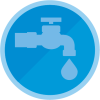Lake Superior: Natural Resources, Culture and Climate Change
June 12-14, 2019
Ashland and Bayfield Counties and the Bad River and Red Cliff Tribal Communities of Wisconsin
Within the Lake Superior basin, global climate change is expected to cause increased annual temperature, decreased snow, and more frequent and extreme weather events. The Lake Superior Ojibwe have traditional ecological knowledge of the environment that has evolved over thousands of years, providing long term place-based supporting evidence of a changing climate. These changes are likely to affect local economies dependent upon the region's cultural and natural resources such as subsistence and recreational fishing, forest product manufacturing, wildlife, tourism, recreation and agriculture. Lake Superior tribal and coastal communities are already experiencing climate challenges and are implementing culturally relevant strategies to become more climate resilient.
This workshop provides field experience-based climate change training within Lake Superior's coastal communities and tribal lands. You will learn effective communication and response strategies that integrate qualitative and quantitative knowledge to increase climate literacy and promote resiliency--no matter what the community, audience, or location.
Workshop Outcomes
By participating in this workshop, you will be able to:
Explain and apply different qualitative and quantitative methods and techniques for measuring and monitoring climate change impacts on terrestrial and aquatic ecosystems.
Apply backcasting and forecasting models to assess the impacts of past and future climate impacts in terrestrial and aquatic ecosystems, and key indicator species, supporting human cultures and economies.
Engage, communicate, and build relationships for future collaborations with tribal natural resource and cultural professionals, governmental agencies, and community decision-makers.


